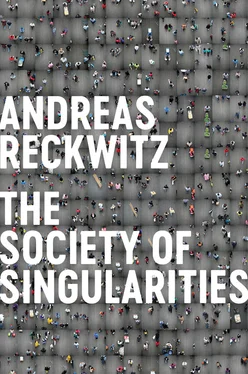Introduction: The Proliferation of the Particular
Wherever we look in today’s society, what has come to be expected is not the general but the particular . Rather than being directed toward anything standardized or regular, the hopes, interests, and efforts of institutions and individuals are pinned on the unique and singular.
Travelers, for instance, are no longer satisfied with the uniform vacation destinations associated with mass tourism. Instead, it is the uniqueness of a location, the authentic atmosphere of a particular city, an exceptional landscape, or a particular local culture that piques the interest of tourists. And this is only one example among many, for this development has encompassed late modernity’s entire global economy. In the case of both services and material goods, the mass production of uniform products has been replaced by events and objects that are not the same or identical for everyone but are rather intended to be unique – that is, singular . People have thus become passionate about extraordinary occasions such as live concerts and music festivals, sporting events and art shows, but also about lifestyle sports and the imaginary worlds of computer games. The so-called ethical consumer has developed discerning tastes for different types of bread and coffee in a way that had previously, at best, been typical of wine connoisseurs. Instead of buying a new sofa “off the rack” (so to speak), many people prefer to search for a vintage piece, and a brand such as Apple offers not only the latest technology but a whole environment that is attractive and unique, and that the user would be unwilling to trade for any other. Finally, various forms of psychological treatment offer tailored therapeutic or spiritual services.
More and more, the late-modern economy has become oriented toward singular things, services, and events, and the goods that it produces are no longer simply functional. Instead, they also – or even exclusively – have cultural connotations and appeal to the emotions. We no longer live in the age of industrial capitalism but in that of cultural capitalism . 1This has profound consequences for the professional world as well. Whereas industrial society focused on clearly defined formal qualifications and performance requirements, in today’s knowledge and culture economy the working subject has to develop a “profile” that is out of the ordinary. Now those who achieve, or promise to achieve, something extraordinary – something far above average – are rewarded, while employees who perform routine tasks lose out.
Without a doubt, the economy sets the pace of society, but by now the shift from the general to the particular has taken place in many other areas as well – for instance, in education. 2Unlike 20 years ago, it is no longer enough for schools successfully to teach the curriculum required by the state. Every school has and wants to be different, has and wants to cultivate its own educational profile and provide pupils (and their parents) with the opportunity to forge a unique educational path. And parents, at least those in the educated middle class, regard their individual children as people whose particular talents and characteristics should be fostered and encouraged.
Another area in which the rise of the singular has been observable for some time is architecture. With its repetitive structures, the International Style seems rather monotonous, and it has largely been neglected since the 1980s in favor of unique designs, so much so that it seems necessary for today’s museums, concert halls, flagship stores, and apartment buildings to be built in an original style (sometimes these styles are striking, sometimes merely odd). Hidden behind all of this lies a fundamental transformation of spatial structures. In globalized and urbanized late modernity, the interchangeable spaces of classical modernity are to be replaced with recognizable individual places , each with a unique atmosphere that can be associated with specific narratives and memories. In the name of so-called cultural regeneration, cities large and small have thus made concerted efforts to develop their own local logic, one that promises a particular quality of life and has its own unique selling points. And the new middle class has flocked to these teeming cities, while other, less attractive, regions (be they in the United States or France, Great Britain or Germany) are in danger of becoming deserted altogether.
It is no surprise, then, that the late-modern subjects who move in these environments seek satisfaction in the particular. The type of subject that predominated in the West up to the 1970s – that is, the average employee with an average family in the suburbs, whom David Riesman described as being “socially adjusted” 3– has become, in Western societies, an apparently conformist negative foil to be avoided by the late-modern subject. In this regard, Ulrich Beck and others have written a great deal about individualization – meaning that subjects have been liberated from general social expectations and freed to practice self-responsibility. 4Singularization, however, means more than independence and self-optimization. At its heart is a more complex pursuit of uniqueness and exceptionality, which has not only become a subjective desire but also a paradoxical social expectation . This is especially pronounced in the new, highly qualified middle class – that is, in the social product of educational expansion and post-industrialization that has become the main trendsetter of late modernity. Here, everything in one’s lifestyle is measured according to the standard of “specialness”: how one lives, what one eats, where and how one travels, and even one’s own body and circle of friends. In the mode of singularization, life is not simply lived; it is curated . From one situation to the next, the late-modern subject performs his or her particular self to others, who become an audience, and this self will not be found attractive unless it seems authentic. With their profiles, the omnipresent social media are one of the central arenas for crafting this particularity. Here, the subject operates within a comprehensive social market governed by attractiveness, in which there is an ongoing struggle for visibility that can only be won by those who seem exceptional. Late modernity has turned out to be a culture of the authentic that is simultaneously a culture of the attractive .
Finally, the displacement of industrial society’s logic of the general by late modernity’s logic of the particular has had extraordinarily profound effects on the social, collective, and political forms of the early twenty-first century. It is not only individuals and objects that have been singularized: collectives have been singularized as well! Of course, formal organizations, political parties, and the bureaucratic state exist further in the background, yet even they are on the defensive against particular and temporary forms of the social that promise higher degrees of identification. The latter undermine universal rules and standard procedures by cultivating worlds of their own, each with its own identity. This is true of collaborations and projects in the professional and political world that, as affective entities with particular participants and fixed deadlines, are each unique. And it is also true of the scenes, political subcultures, leisure clubs, and consumer groups in the real and virtual worlds that, as aesthetic or hermeneutic voluntary communities with highly specific interests and world views, distance themselves quite far from popular culture and mainstream politics.
The singularization of the social also applies to the ubiquitous political and sub-political neo-communities in which a given historical, geographical, or ethical peculiarity is taken as the basis of a commonly imagined culture. This is a broad field that includes the identity politics of ethnic communities and diasporas that have formed over the course of global migration flows. In many places, too, new religious and fundamentalist communities (mostly Christian or Muslim) have begun to spread that lay claim to a sort of religious exceptionalism. Within this context, the right-wing political populism that has arisen since the turn of the millennium has invoked the cultural authenticity of one’s own people and their national culture. At the same time, but in a different way, “cultural diversity” became a guiding principle of liberal social and cultural politics around the beginning of the twenty-first century.
Читать дальше












